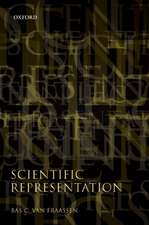Representational Ideas: From Plato to Patricia Churchland: Synthese Library, cartea 250
Autor R. A. Watsonen Limba Engleză Hardback – 30 noi 1995
For students, scholars and researchers in neuroscience, cognitive science, philosophy of mind, and modern philosophy.
| Toate formatele și edițiile | Preț | Express |
|---|---|---|
| Paperback (1) | 635.80 lei 6-8 săpt. | |
| SPRINGER NETHERLANDS – 8 oct 2012 | 635.80 lei 6-8 săpt. | |
| Hardback (1) | 641.53 lei 6-8 săpt. | |
| SPRINGER NETHERLANDS – 30 noi 1995 | 641.53 lei 6-8 săpt. |
Din seria Synthese Library
- 15%
 Preț: 638.43 lei
Preț: 638.43 lei - 18%
 Preț: 989.98 lei
Preț: 989.98 lei - 15%
 Preț: 596.69 lei
Preț: 596.69 lei - 18%
 Preț: 903.93 lei
Preț: 903.93 lei - 15%
 Preț: 586.88 lei
Preț: 586.88 lei - 15%
 Preț: 696.50 lei
Preț: 696.50 lei - 18%
 Preț: 892.90 lei
Preț: 892.90 lei - 15%
 Preț: 643.34 lei
Preț: 643.34 lei -
 Preț: 282.33 lei
Preț: 282.33 lei - 5%
 Preț: 372.19 lei
Preț: 372.19 lei -
 Preț: 443.10 lei
Preț: 443.10 lei - 15%
 Preț: 637.59 lei
Preț: 637.59 lei - 18%
 Preț: 958.88 lei
Preț: 958.88 lei - 15%
 Preț: 642.36 lei
Preț: 642.36 lei - 18%
 Preț: 1230.66 lei
Preț: 1230.66 lei - 15%
 Preț: 642.83 lei
Preț: 642.83 lei - 18%
 Preț: 1000.39 lei
Preț: 1000.39 lei -
 Preț: 389.70 lei
Preț: 389.70 lei - 15%
 Preț: 637.28 lei
Preț: 637.28 lei - 18%
 Preț: 952.26 lei
Preț: 952.26 lei - 18%
 Preț: 1231.32 lei
Preț: 1231.32 lei - 15%
 Preț: 645.96 lei
Preț: 645.96 lei -
 Preț: 395.85 lei
Preț: 395.85 lei -
 Preț: 400.47 lei
Preț: 400.47 lei - 18%
 Preț: 1225.48 lei
Preț: 1225.48 lei - 15%
 Preț: 638.89 lei
Preț: 638.89 lei - 18%
 Preț: 1232.09 lei
Preț: 1232.09 lei -
 Preț: 380.45 lei
Preț: 380.45 lei -
 Preț: 394.87 lei
Preț: 394.87 lei - 15%
 Preț: 640.37 lei
Preț: 640.37 lei - 15%
 Preț: 639.08 lei
Preț: 639.08 lei -
 Preț: 381.98 lei
Preț: 381.98 lei - 15%
 Preț: 643.00 lei
Preț: 643.00 lei - 15%
 Preț: 672.29 lei
Preț: 672.29 lei
Preț: 641.53 lei
Preț vechi: 754.74 lei
-15% Nou
Puncte Express: 962
Preț estimativ în valută:
122.75€ • 128.18$ • 101.37£
122.75€ • 128.18$ • 101.37£
Carte tipărită la comandă
Livrare economică 15-29 aprilie
Preluare comenzi: 021 569.72.76
Specificații
ISBN-13: 9780792334538
ISBN-10: 0792334531
Pagini: 184
Ilustrații: XIII, 184 p.
Dimensiuni: 155 x 235 x 13 mm
Greutate: 0.45 kg
Ediția:1995
Editura: SPRINGER NETHERLANDS
Colecția Springer
Seria Synthese Library
Locul publicării:Dordrecht, Netherlands
ISBN-10: 0792334531
Pagini: 184
Ilustrații: XIII, 184 p.
Dimensiuni: 155 x 235 x 13 mm
Greutate: 0.45 kg
Ediția:1995
Editura: SPRINGER NETHERLANDS
Colecția Springer
Seria Synthese Library
Locul publicării:Dordrecht, Netherlands
Public țintă
ResearchCuprins
1. Introduction.- 1. Appearance and Reality.- 2. Representational Ideas.- 3. Platonic Ideas.- 4. Aristotelean Forms.- 5. Like Knows Like.- 6. Ideas as Effects and Things as Causes.- 7. Resemblance.- 8. Ontological Models.- 2. Descartes.- 1. Image and Concept.- 2. Imagination and Understanding.- 3. Sensations and Images.- 4. Non-Resembling Ideas.- 5. The Priority of Ontology.- 6. What is an Idea?.- 7. What in an Idea Makes it be of its object?.- 8. Summary Conclusion.- 3. Malebranche and Arnauld.- 1. Faculties, Capacities, and Dispositions.- 2. Act, Content, and Object.- 3. Ideas as Independent Objects.- 4. Ideas as Acts of Mind.- 5. Ideas as Transparent, as Searchlights, and as Grapples.- 4. Locke, Berkeley, and Hume.- 1. Primary and Secondary Ideas.- 2. Non-Representational Ideas.- 3. Particular Ideas.- 5. The Picture Theory.- 1. Wittgenstein.- 2. Carnap.- 3. Goodman.- 6. Neurophilosophy.- 1. Patricia Churchland.- 2. Ruth Millikan.- 3. Robert Cummins.- 4. Mark Rollins.- 7. Having Ideas.- 8. Conclusion.- Notes.- Name Index.




















